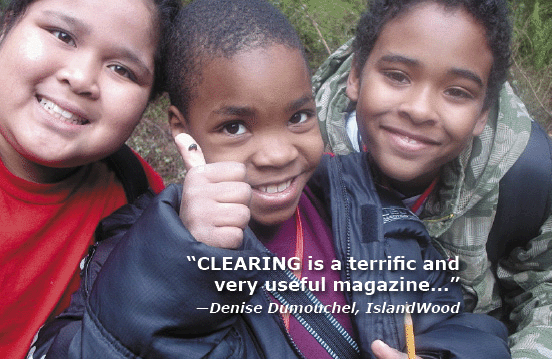 Guest Editor: R. Justin Hougham, Ph.D.
Guest Editor: R. Justin Hougham, Ph.D.
Associate Professor, University of Wisconsin-Madison
Special Advisor: Derek Hoshiko, Community Organizer and Educator on Climate Change and Environmental Equity
 e are excited to bring our readers this special edition of CLEARING Magazine. This issue focuses on Justice, Equity, Diversity and Inclusion (JEDI) in the environmental education field. For the last several years in general, and especially last year, we have seen a rising consciousness and call to action towards justice and equity initiatives throughout education and accordingly within environmental education as this publication and special issue reflects. This conversation and sharing of resources continues to evolve through both a raised awareness of equity and anti-racism issues, and through action towards environmental justice. This issue reflects practitioner insight from a wide array of venues, geographies, and pedagogies. It features contributions from Colorado, Washington, Idaho, Ontario, and California.
e are excited to bring our readers this special edition of CLEARING Magazine. This issue focuses on Justice, Equity, Diversity and Inclusion (JEDI) in the environmental education field. For the last several years in general, and especially last year, we have seen a rising consciousness and call to action towards justice and equity initiatives throughout education and accordingly within environmental education as this publication and special issue reflects. This conversation and sharing of resources continues to evolve through both a raised awareness of equity and anti-racism issues, and through action towards environmental justice. This issue reflects practitioner insight from a wide array of venues, geographies, and pedagogies. It features contributions from Colorado, Washington, Idaho, Ontario, and California.
For readers in leadership roles or for those looking to influence organizational decision making during and beyond the COVID-19 era, seven salient and actionable suggestions are presented in “Racial Equity in Outdoor Science and Environmental Education: Re-Establishing the Field with Intention” (pg. 9). “Equity in a Time of Socio-Environmental Justice” (pg. 12) presents a call to action and solidarity in the ‘intergenerational fight for socio-environmental justice.’ Derek Hoshiko provides a case study of pushing for equity work by centering student voices and confronting far right pushback in “Promoting Equity and Justice at the School and Community Level” (pg. 16). Towards a landscape-wide narrative perspective with tribal youth, writers from Idaho explore these concepts through “River Newe: Creating New Narratives on Historic Landscapes” (pg. 20), inspired by time on the Salmon River. For readers interested in instruction in the collegiate context, Juan Miguel Arias and Howard Drossman explore the context and themes of power and equity in the Colorado College TREE semester (pg. 24). As always, CLEARING Magazine presents additional connections and resources that can broaden and directly apply to JEDI work and initiatives across the education community.
Environmental education reaches millions of students and community members a year in a vast array of venues, so consider that these are millions of opportunities to connect learners to core environmental science concepts, while also showing a wider look at environmental justice in the local and global issues that we face today and into the future. We look at the work in this issue to inspire the courage to be better, to do the work. JEDI is not a privilege granted to us—while it is true that the arc of the moral universe bends toward justice, justice is not achieved through unchecked privilege, rather through hard work, self-examination, collaboration, accountability, and making the most of every opportunity to lift each other up.
Everywhere we look outside of ourselves to find hope in a culture dominated by systems of oppression, we see inaction and injustice. We see this in the failed COP26 conference, and we see it in communities dominated by money and ‘power over.’ At COP26, we were supposed to see increased ambition over the Paris climate accord. Everywhere we take responsibility, we are able to become response-able, and with courage, face the triple pandemic of racism, COVID-19 pandemic, and the climate emergency.
Our hope that you will enjoy this issue lies in knowing that, while much work lies ahead, there is inspiration in the work in the field of environmental education as told in the stories herein, and in the work that our readers do on a daily basis.
In gratitude,
R. Justin Hougham, Ph.D.
and Derek Hoshiko

